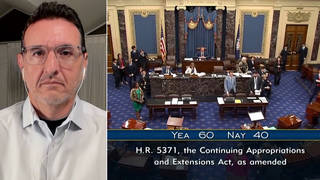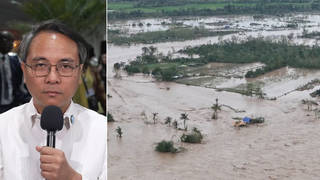
Topics
Guests
- Stephen LewisFormer Special Envoy for HIV/AIDS in Africa; chair of the Stephen Lewis Foundation, which funds community-based AIDS initiatives in Africa; and co-director of AIDS-Free World, a new international AIDS advocacy organization based in Boston.
The Centers for Disease Control and Prevention has acknowledged it has drastically underestimated the number of people becoming infected with AIDS in the United States. The CDC had been reporting 40,000 people get infected each year, but now the agency estimates the figure is 56,000 — an increase of 40 percent. The CDC reportedly knew about the increased number of cases since last year but waited to make the announcement until the opening of the International AIDS Conference in Mexico. We speak with Stephen Lewis, the former UN envoy on AIDS in Africa and and co-director of AIDS-Free World, who is taking part in the International AIDS Conference in Mexico City. [includes rush transcript]
Transcript
AMY GOODMAN: The Centers for Disease Control and Prevention has acknowledged it’s drastically underestimated the number of people becoming infected with AIDS here in the United States. The CDC had been reporting 40,000 people get infected each year, but now the agency estimates the figure is more like 56,000, an increase of 40 percent.
CDC officials said the higher infection rates were discovered after using the agency’s new blood-test technology. The Wall Street Journal reports the CDC knew about the increased number of cases since last year but waited to make the announcement until the opening of the International AIDS Conference in Mexico.
AIDS activists are now calling for increased federal funding for AIDS prevention programs. Since 2002, the CDC’s prevention budget has shrunk by 19 percent when adjusted for inflation.
Stephen Lewis joins us now from Mexico City, the former UN envoy on AIDS in Africa, the chair of the Stephen Lewis Foundation, which funds community-based AIDS initiatives in Africa. And he co-directs AIDS-Free World, a new international AIDS advocacy group that is based in Boston.
We welcome you to Democracy Now!
You’re participating in the International AIDS Conference. What is most significant about this gathering this year?
STEPHEN LEWIS: I would say, Amy, what’s most significant, there are two things. One is that the conference is dealing with concentrated epidemics, that is, epidemics about — around men having sex with men, injecting drug use and sex work, much more than they have ever dealt with before. The concentration before, of course, was on the generalized pandemic in Africa, where the virus is transmitted heterosexually. But these high-risk groups, which have not received the attention they should over the years, are receiving much more attention at this conference, along with a similar emphasis on prevention.
AMY GOODMAN: And can you talk about the significance of the CDC understating the incidence of AIDS in this country by something like 40 percent, saying they were waiting until the AIDS conference, many months later, after they realized what was happening? And it also goes to the issue of funding for AIDS in the United States.
STEPHEN LEWIS: It’s completely irresponsible, and it takes one’s breath away. The important thing about statistical material, epidemiological material on AIDS is to release it as soon as you’re pretty confident of its content, because every measure of policy depends on the information you have. And so, they lost many months unnecessarily, when they had a dramatic revision of the figures, which showed that their own statistical compilations were sorely lacking.
And this constant cutting of the budget, the absurd emphasis on abstinence, the effort to criminalize sex work, when that’s a high-risk group, which must be dealt with, because of viral transmission, the whole approach of the Bush administration and of the CDC has been seriously wanting. I mean, the failure in the United States is mirrored only by the failure of some of the UN itself, which should have acted much more vigorously over the years.
AMY GOODMAN: Last week, we did a report on the new Black AIDS Institute report, which said that if blacks in the United States constituted their own country, the nation would rank sixteenth in the world in the number of people living with HIV, that two percent of adult black Americans are infected with the virus, and only four countries outside Africa have a higher HIV prevalence.
STEPHEN LEWIS: Yes. That was an astonishing news story. I remember I read it first by Larry Altman in the New York Times, and I have to say that, again, I was quite taken aback, because it demonstrates what all of us have known, or at least have intuitively known, that the carnage within the African American community is very, very significant and that it’s a leading cause of death particularly amongst African American women in their productive years, and yet the energy, the urgency, that should attach to the response is almost nowhere to be found.
It may be that President Bush can be heralded for the PEPFAR program dealing with matters international, although I’m not so excited about it as others are, but certainly there has been a failure domestically in the United States, which is clearly identifiable.
AMY GOODMAN: I wanted to ask you about the effect the global food crisis is having on AIDS. Last week, the executive director of UNAIDS, Dr. Peter Piot, said the global food crisis is hindering the fight against AIDS.
DR. PETER PIOT: The current food crisis, which is true in many, many countries — and the poorer you are, the more affected you are by that — is affecting also the fight against AIDS. And we have the paradoxical situation that some people have access to pretty expensive and sophisticated drugs but have no food to eat, nothing to eat, or don’t have the money to take the bus to go to the center and have no job.
AMY GOODMAN: Stephen Lewis, your response?
STEPHEN LEWIS: Well, there’s no question that Peter’s right, of course, but the food prices are only a part of it. The oil prices are complicating things. The effect of climate on southern Africa, where the prevalence rates are highest, the matters of drought that flow from global warming, all of these things are like some kind of conspiracy focused on the southern end of the continent. And what you need is not merely food; you need nutritious food, particularly for those who are on antiretroviral treatment, so that the body can absorb the drugs. And the absence of nutritious food and the difficulty of having the food is desperately complicating things. And frankly, Amy, the breakdown of the international trade agreement, the Doha trade agreement, is yet further prejudicial towards Africa and will compromise the future of the continent. So the combination of food price rise and disease is really a calamitous one.
AMY GOODMAN: Stephen Lewis, I want to thank you very much for being with us. His new organization is called AIDS-Free World











Media Options